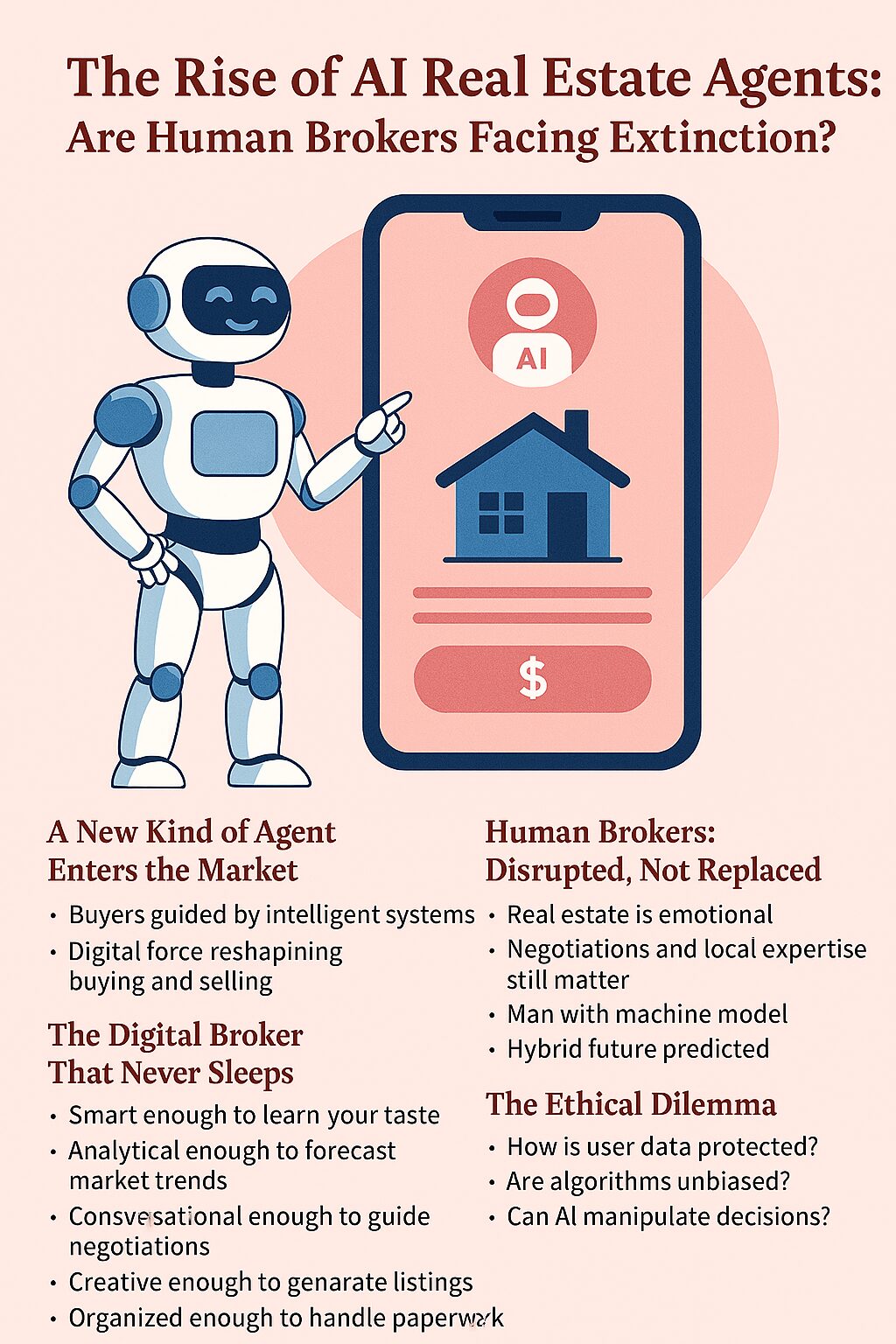Introduction
The real estate industry is undergoing a digital revolution. In 2025, AI-powered real estate agents are no longer a futuristic concept—they’re a competitive reality. With machine learning, predictive analytics, and virtual assistants now handling property searches, valuations, and negotiations, many are asking: Is this the end of human brokers?
🤖 What Are AI Real Estate Agents?
AI real estate agents are software systems that use artificial intelligence to perform tasks traditionally handled by human brokers. These include:
- Property search and recommendations
- Market analysis and pricing predictions
- Virtual tours and listing creation
- Automated negotiations and contract generation
- Customer support via chatbots and voice assistants
Platforms like Zillow, Redfin, and emerging proptech startups are integrating AI to streamline the buying and selling process.
📊 How AI Is Transforming Real Estate
| AI Feature | Impact on Real Estate Transactions |
|---|---|
| 🧠 Predictive Analytics | Forecasts property value trends and investment potential |
| 🏘️ Smart Property Matching | Matches buyers with homes based on lifestyle and budget |
| 🖼️ AI-Generated Listings | Creates compelling descriptions and edits photos automatically |
| 🗣️ Voice-Activated Search | Enables intuitive home searches via smart devices |
| 💬 Chatbots & Virtual Assistants | Handles inquiries, schedules tours, and guides users |
AI systems can analyze thousands of listings and user behaviors in seconds, offering hyper-personalized recommendations.
📉 Are Human Brokers Becoming Obsolete?
While AI excels in speed, accuracy, and scalability, it lacks the emotional intelligence and nuanced judgment that human agents bring to the table. Real estate transactions often involve:
- Complex negotiations
- Legal and financial guidance
- Emotional support during life-changing decisions
- Local market expertise and personal relationships
Experts argue that AI will augment, not replace, human brokers. The future points toward a hybrid model where agents use AI tools to enhance their services.
🌍 Global Adoption & Market Trends
- 60% of real estate firms now use AI tools for property valuation and lead generation
- 35% of buyers prefer AI-assisted platforms for initial property searches
- 80% of agents believe AI improves their productivity and client satisfaction
Countries like the United States, Germany, and Singapore are leading in AI real estate adoption.
⚠️ Challenges & Ethical Considerations
Despite its benefits, AI in real estate raises concerns:
- 🔍 Data Privacy: How is user data collected and protected?
- ⚖️ Bias in Algorithms: Are AI models fair across demographics and regions?
- 🤝 Loss of Human Touch: Can AI truly understand emotional needs and cultural nuances?
Regulatory frameworks and ethical AI design will be crucial to ensure transparency and trust.
🔍 SEO Tips for Real Estate Tech Writers
✅ High-Impact Keywords
- “AI real estate agents”
- “proptech trends 2025”
- “automated property valuation”
- “AI vs human brokers”
✅ Metadata Optimization
- Meta Title: “AI Real Estate Agents: The End of Human Brokers?”
- Meta Description: “Explore how artificial intelligence is reshaping real estate, with AI agents challenging the role of traditional brokers in 2025.”
✅ Structured Formatting
- Use headings, tables, and bullet points for readability
- Include alt text for visuals (e.g., “AI-powered real estate dashboard interface”)
Conclusion
AI real estate agents are redefining the property market—bringing speed, precision, and personalization to every transaction. But while algorithms can crunch numbers and schedule tours, they can’t replace the empathy, intuition, and trust that human brokers offer.

